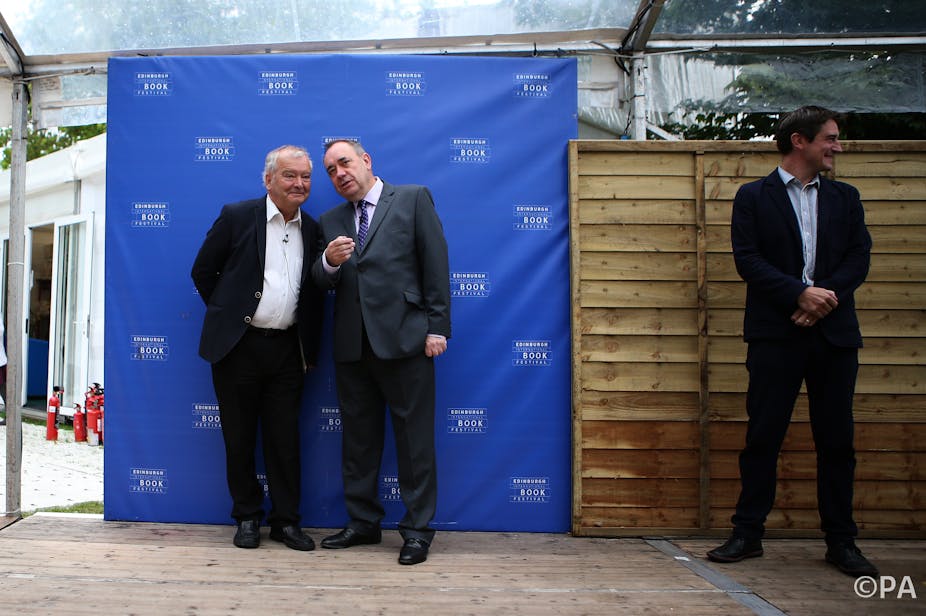Much debate, and perhaps even more invective, has buffeted Scotland during the marathon referendum campaign. But Scotland’s 15 universities have been left surprisingly untouched by the tumult, at least on the surface.
Some university staff have got involved in the Better Together and Yes Scotland campaigns, but the numbers are perplexingly meagre given the potentially dramatic challenges confronting the sector. Scottish universities do very well from the union, and advocates of independence often struggle to show how equivalent funding from a much smaller tax base could continue.
Hesitant academics have allowed the intellectual side of the referendum debate to be occupied by celebrities. Those with backgrounds in the media, pop music and acting (with a few writers making up the rear) have given them the confidence to raise their voices. They are overwhelmingly pro-independence. The rhetoric of the SNP government and its artful leader Alex Salmond proclaiming vague but insistent change resonates with them. We were promised a summer of intellectual ferment that would rival San Francisco in the late 1960s. But though the Scottish weather for once has been more Californian than sub-Arctic, the heather has yet to be set ablaze.
Into the ring
This brings us to Tom Devine – one academic who has belatedly climbed into the ring. Devine is easily Scotland’s most high-profile historian. His recent announcement that he will be voting for independence rightly made news across the media. Nearly 70, he has seen the need to convey his work to the wider society. He is a Caledonian version of AJP Taylor – the original television don who had a knack for communing with wide audiences in public lecture halls and on television.

Devine has also made a tremendous contribution to writing up the history of modern Scotland, arguably an under-explored field until the 1980s. The Scottish Nation: A Modern History is his magnum opus. When it was first published in 1999, his academic reputation was secured. The book was viewed as the most comprehensive attempt at relating Scotland’s modern journey to a general audience.
He has now decided that the logical end-point of this journey is independence. This will hardly come as a surprise to many. In a blaze of farewell lectures across Scotland, he has sotto voce made the case for a fresh political departure. For instance he revealed with some relish in February that Scots of an Irish-Catholic background are the most likely religious grouping to vote for independence.
He was speaking in Coatbridge where perhaps the largest concentration of Scots with Irish heritage are to be found. This is his own background and he believes that the story of this contested immigrant community voyaging from the margins to the mainstream of Scottish life is a metaphor for his own journey towards being the country’s national pedagogue.
In the account of his conversion to nationalism, he also seems to draw a parallel between this story of lowly folk finally getting their chance and Scotland’s own search for self-realisation. Religion used to be the chief badge of identity for this community and it figured prominently in Devine’s earlier scholarship. But devoutness has given way to hedonism and risk-taking, especially among the men. Disaffection has spread, especially in the poorer communities. Men who now have few links with Britain could be ready to believe Devine’s assertion that an economically resilient Scotland can have a viable future.
Rare criticism
“The future is not my area”, used to be one of Devine’s stock phrases when he was asked about independence. But now that he has embraced the cause, he makes assertions about the economy, the benefits of the EU for Scotland, how universities can flourish, and the potential energy revolution. When he writes he sounds almost like a prophet. Comparisons with Thomas Carlyle, the 19th-century Scottish historian who became an extravagant champion of the British cause but believed in an interventionist state ruled by an aristocracy of talent, are not that far-fetched.
Gerry Hassan, a well-known Scottish commentator, stated that when Tom Devine’s egalitarian rhetoric is stripped away, his vision of social democracy “is in effect a mirage” and it is a hierarchical “middle-class preservation society” that he is holding out for.
This was one of the rare critical comments about Devine’s conversion (albeit from a supporter of independence). When the pro-union writer David Torrance mildly rebuked the historian for accepting a knighthood from the British state on the eve of making a declaration which effectively proclaimed that this state was now redundant in Scotland, another journalist, Iain MacWhirter, perhaps only half-jokingly warned on Twitter that he was committing lèse-majesté. This tells you something about the sense of hierarchy that is alive and well in Scotland.
In his own sphere, Devine is very much a “big man” along the lines of Alex Salmond. He is an operator who was able to defend the departments which he headed in various institutions in highly competitive times, just as the SNP leader has aggressively defended the Scotland he now rules in confrontations with Westminster.
Devine extols fierce verbal confrontation, or what was known in medieval times as “flyting”. Polemics aside, men of learning back then were still expected to endorse the orthodoxy of the day. Scotland was a small, tightly controlled country challenged by a harsh climate and sharp geographical divisions. The pluralism which existed in England was generally viewed as a luxury that Scotland simply couldn’t afford.
Instead of Scotland embracing deep-seated change, it is possible to argue instead that it is trying to substitute a set of British orthodoxies for Scottish ones. At the peak of his influence, Tom Devine has embraced a nationalist cause in which, from his recent lengthy statement, it is quite possible to depict England as “the other”. A man of his learning and experience should know better.

